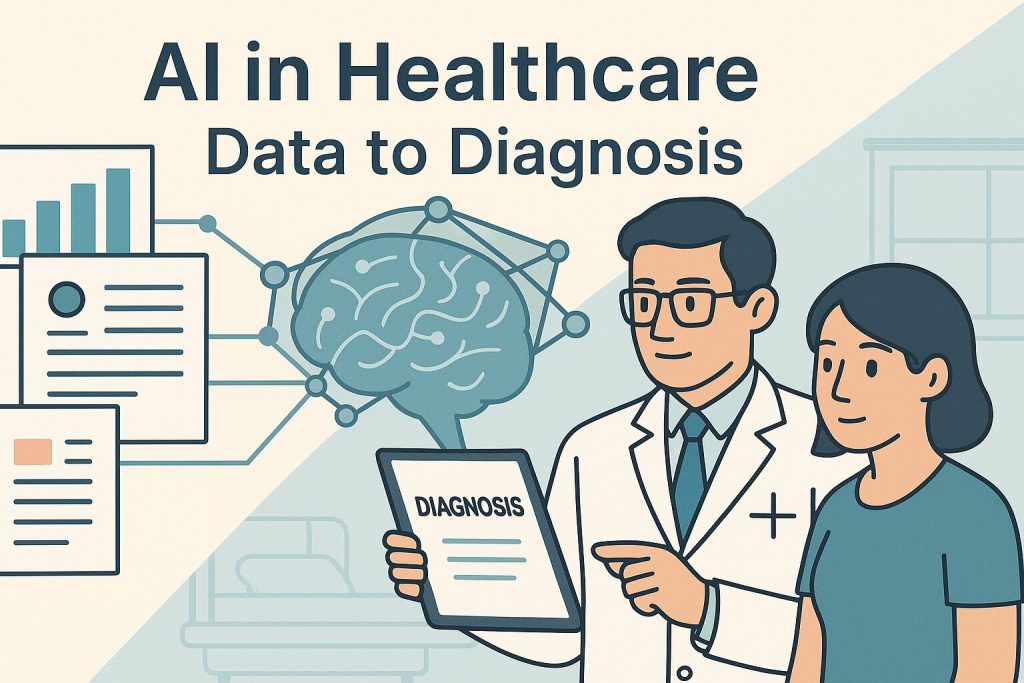Artificial intelligence is rapidly transforming the healthcare landscape. From enhancing diagnostic accuracy to streamlining patient care, AI’s potential is immense. However, its integration into healthcare systems is not without challenges. These obstacles extend beyond technology, encompassing ethical dilemmas, data security, legal uncertainties, and trust issues.
While AI has incredible potential to transform healthcare, from diagnostics to predictive analytics, its implementation doesn’t come without complications. If you want to explore real-world AI applications in healthcare, our dedicated post covers key use cases.
In this comprehensive guide, we delve into the real-world challenges of implementing AI in healthcare and provide practical solutions. Whether you’re a healthcare professional, tech developer, or simply interested in the future of medicine, this article offers valuable insights to navigate the complexities of AI integration.
Table of Contents
ToggleUnderstanding Core AI Challenges in Healthcare
AI holds the promise of revolutionizing medicine, but several key challenges hinder its widespread adoption:
-
Data Quality and Privacy: Healthcare data is often fragmented and inconsistent, making it difficult for AI systems to function effectively.
-
Ethical Concerns: AI models can inadvertently perpetuate existing biases present in training data, leading to unequal treatment outcomes.
-
Regulatory Hurdles: Current policies lag behind technological advancements, creating legal ambiguities in AI deployment.
-
Workforce Skepticism: Healthcare professionals may be hesitant to adopt AI tools due to fears of job displacement or lack of trust in the technology.
-
Cost and Complexity: Implementing AI solutions can be expensive and technically challenging, especially for smaller organizations.
-
Addressing these interconnected challenges requires a holistic approach that considers technical, ethical, and human factors.

Data Dilemmas: Privacy, Quality, and Access
Poor Data Quality and Fragmentation
AI systems rely on high-quality data to function effectively. In healthcare, data is often siloed across various platforms, leading to incomplete or inconsistent information.
Solutions:
-
Standardization: Adopt data standards like FHIR or HL7 to ensure interoperability between systems.
-
Collaboration: Partner with other healthcare institutions to create comprehensive datasets.
-
Synthetic Data: Utilize synthetic data to fill gaps while maintaining patient privacy.
Privacy and Security Risks
Protecting patient data is paramount. AI systems must be designed with robust security measures to prevent breaches and maintain trust.
Solutions:
-
Encryption: Implement end-to-end encryption for data at rest and in transit.
-
Access Controls: Use role-based permissions to limit data access.
-
Regular Audits: Conduct security audits to identify and address vulnerabilities.
-
Compliance: Ensure adherence to regulations like HIPAA and GDPR.
These privacy frameworks are essential to avoid costly penalties and build patient trust. Organizations must ensure their AI systems are developed with compliance-first architecture — something that reliable healthcare software development services can enable.
Ethical Considerations in AI Implementation
Ethical challenges arise when AI systems inadvertently reinforce biases or lack transparency in decision-making processes.
Solutions:
-
Diverse Datasets: Train AI models on data that reflects diverse populations to minimize bias.
-
Fairness Audits: Regularly assess AI systems for discriminatory patterns.
-
Explainable AI (XAI): Develop AI tools that provide clear reasoning behind their outputs.
-
Ethics Oversight: Involve ethicists throughout the AI development lifecycle to guide responsible practices.
Navigating Legal and Regulatory Landscapes
The legal framework for AI in healthcare is still evolving, leading to uncertainties in accountability and compliance.
Solutions:
-
Clear Accountability: Define responsibilities among developers, providers, and users.
-
Certification Standards: Establish criteria for evaluating and approving AI tools.
-
Adaptive Regulations: Develop flexible policies that can evolve with technological advancements.
-
Transparency: Maintain detailed documentation of AI decision-making processes. Documenting how decisions are made can significantly improve accountability and quality control. Read more about these challenges and solutions at Forbes on AI Regulations.
Technical and Integration Challenges
Infrastructure and Interoperability
Many healthcare systems operate on outdated infrastructure, hindering AI integration.
Solutions:
-
Open APIs: Utilize open application programming interfaces to facilitate communication between systems.
-
Unified Data Standards: Implement consistent data formats across platforms.
-
Vendor Collaboration: Work with technology providers who prioritize interoperability. Choose vendors that design their systems with integration in mind from the start. You can learn more about Health IT Interoperability from the U.S. Health IT site.
A skilled custom software development company can help modernize outdated infrastructure, ensuring seamless interoperability across platforms.
Skill Gaps
A lack of AI literacy among healthcare professionals can impede adoption.
Solutions:
-
Training Programs: Offer education on AI tools and their applications.
-
Leadership Roles: Appoint Chief AI Officers to oversee integration strategies.
-
Academic Partnerships: Collaborate with educational institutions to develop AI curricula.

Building Trust and Encouraging Adoption
Resistance to AI often stems from fear of the unknown or concerns about job security.
Solutions:
-
Inclusive Implementation: Involve staff in the AI adoption process from the outset.
-
Transparent Communication: Clearly articulate the benefits and limitations of AI tools.
-
Patient Engagement: Educate patients on how AI enhances, rather than replaces, human care.
- Human-Centered Design: To foster trust and drive AI adoption in healthcare, it’s crucial to involve healthcare professionals early in the implementation process, clearly communicate the benefits of AI, and provide training that builds confidence. Emphasizing human-centered design can significantly enhance the acceptance and effectiveness of AI tools. For more insights, refer to Harvard Business Review’s article on Putting Humans at the Center of Health Care Innovation.
Financial Considerations: Budgeting for AI
The cost of AI implementation can be a barrier, particularly for smaller organizations.
Solutions:
-
Pilot Programs: Start with small-scale projects to assess feasibility and ROI.
-
Public-Private Partnerships: Seek collaborations to share costs and resources.
-
Flexible Models: Consider AI-as-a-Service options to reduce upfront expenses.
Actionable Steps to Overcome AI Challenges
-
Secure and Transparent Systems: Prioritize data security and develop explainable AI models.
-
Ethical Oversight: Establish ethics committees to guide AI development and deployment.
-
Human-Centered Design: Design AI tools that complement, not replace, human expertise.
-
Scalable Infrastructure: Invest in infrastructure that supports future growth and integration.
-
Regulatory Collaboration: Engage with policymakers to shape adaptive and supportive regulations.
Ready to implement AI solutions in your healthcare practice?
Contact us today to discover how we can help you overcome these challenges and integrate AI seamlessly into your operations!
Conclusion
While AI presents significant opportunities for enhancing healthcare, its successful integration requires addressing multifaceted challenges. By focusing on data quality, ethical practices, regulatory compliance, technical readiness, and stakeholder engagement, healthcare organizations can harness AI’s potential to improve patient outcomes and operational efficiency.
Frequently Asked Questions
Q1: What are the key challenges of implementing AI in healthcare?
A1: Implementing AI in healthcare involves challenges such as data privacy and security concerns, ethical issues like algorithmic bias, regulatory uncertainties, integration difficulties with existing systems, workforce resistance, and high implementation costs. Addressing these requires a comprehensive approach involving technical solutions, ethical oversight, regulatory engagement, and stakeholder collaboration.
Q2: How can healthcare organizations ensure ethical AI use?
A2: By training AI on diverse datasets, conducting regular fairness audits, implementing explainable AI models, and involving ethicists throughout the development process.
Q3: What strategies can build trust in AI among healthcare professionals?
A3: Involving staff in the implementation process, providing comprehensive training, and clearly communicating the benefits and limitations of AI tools can foster trust.
Q4: How can smaller healthcare providers afford AI implementation?
A4: Starting with pilot programs, exploring public-private partnerships, and considering AI-as-a-Service models can make AI adoption more financially feasible.
Q5: What role does regulation play in AI integration in healthcare?
A5: Regulations provide frameworks for accountability, safety, and ethical use. Engaging with policymakers can help shape adaptive regulations that support AI innovation while protecting patients.
